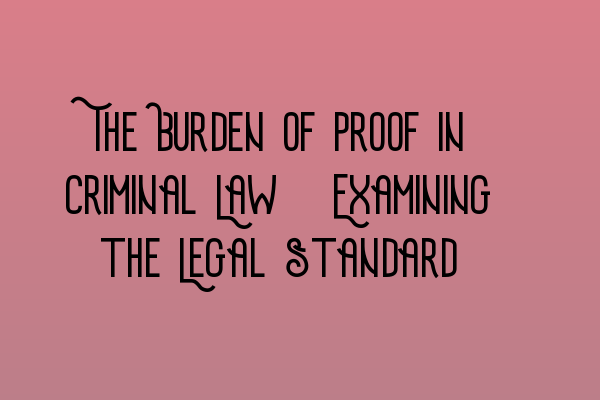The Burden of Proof in Criminal Law: Examining the Legal Standard
Welcome to the SQE Criminal Law & Practice Law UK blog! In this post, we will delve into the intricacies of the burden of proof in criminal law, a fundamental principle that shapes the outcomes of criminal trials. Understanding the legal standard of proof is essential for both aspiring solicitors and seasoned legal professionals.
What is the Burden of Proof?
The burden of proof refers to the duty of the prosecution to establish the guilt of the accused in a criminal case beyond a reasonable doubt. This principle reflects the fundamental principle of “innocent until proven guilty,” ensuring that individuals are not unjustly convicted based on mere suspicions or weak evidence.
It is important to note that the burden of proof lies solely on the prosecution, and the defendant is not obliged to prove their innocence. This reflects the principle that the prosecution has the resources and the responsibility to gather evidence and present a compelling case.
The Legal Standard of Proof
The legal standard of proof in criminal law is “beyond a reasonable doubt.” This standard requires the prosecution to prove its case to a level where there is no plausible doubt in the mind of a reasonable person regarding the defendant’s guilt. It is a high threshold that ensures the integrity and reliability of the criminal justice system.
While it is challenging to define precisely what constitutes “beyond a reasonable doubt,” the courts have provided guidance on its interpretation. It is not a mathematical certainty but rather a moral certainty based on a careful evaluation of all the evidence presented in a case.
When jurors or judges are determining guilt or innocence, they must be firmly convinced of the defendant’s guilt beyond a reasonable doubt. This standard emphasizes the importance of accurate and reliable evidence, considering both direct and circumstantial evidence, witness testimonies, forensic evidence, and any other relevant factors.
The Importance of the Burden of Proof
The burden of proof is crucial in ensuring a fair and just legal system. It protects individuals from arbitrary accusations and safeguards their right to a fair trial. It also encourages a thorough investigation and preparation on the part of the prosecution, ensuring that only credible cases proceed to trial.
Understanding the burden of proof is essential for law students, aspiring solicitors, and criminal law practitioners. It forms the basis of building a strong defense strategy, efficiently cross-examining witnesses, challenging the credibility of evidence, and presenting counterarguments.
To succeed in criminal law practice, it is important to master the principles of the burden of proof and to be able to articulate its significance to clients, judges, and juries. This knowledge will enhance your ability to analyze cases, apply legal principles, and ultimately achieve just outcomes for your clients.
Get Prepared for the SQE Exams
If you are an aspiring solicitor, preparing for the SQE exams is a crucial step towards your legal career. To supplement your studies, we recommend utilizing resources such as the SQE 1 Practice Exam Questions and the SQE 1 Practice Mocks FLK1 FLK2, which provide invaluable practice and assessment.
Additionally, consider enrolling in SQE 2 Preparation Courses and SQE 1 Preparation Courses that can help you build a solid foundation of knowledge and refine your legal skills.
To stay updated on the latest SQE exam dates and other relevant information, make sure to check the SRA SQE Exam Dates page regularly.
Thank you for reading this blog post on the burden of proof in criminal law. We hope you found it informative and engaging. Feel free to explore our website for more valuable content and resources related to SQE Criminal Law & Practice Law UK.
